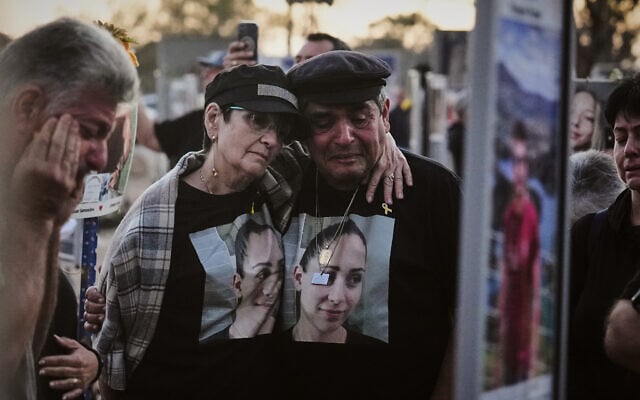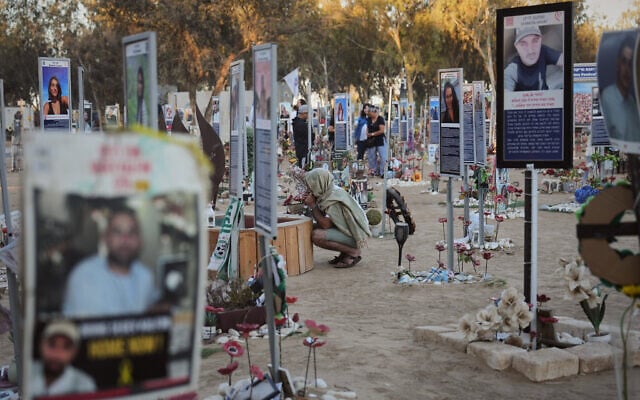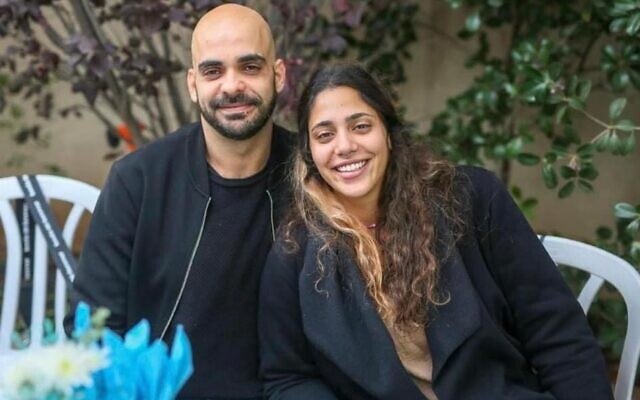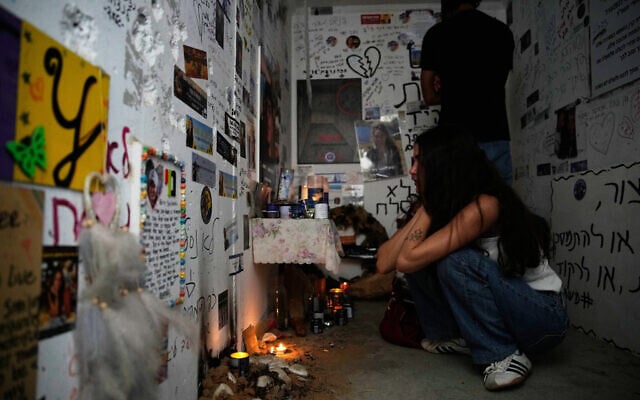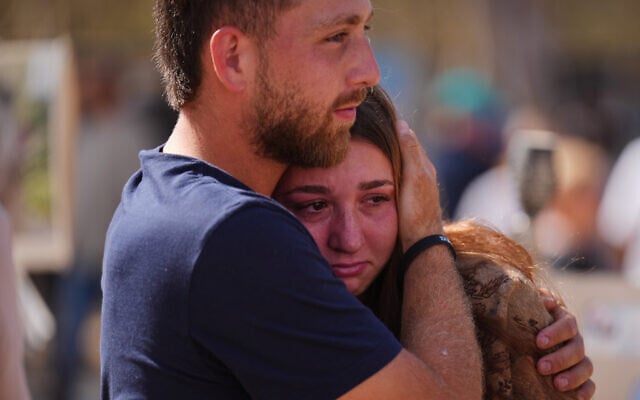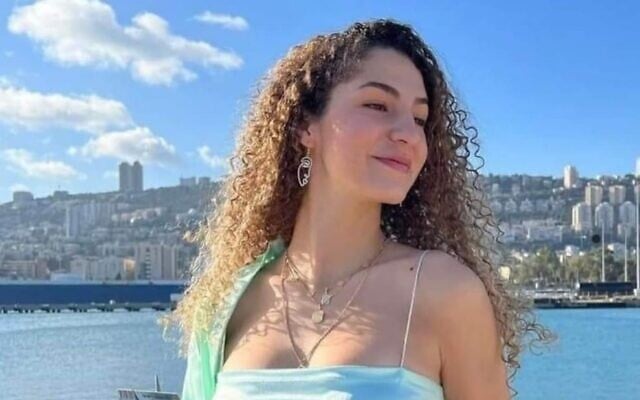

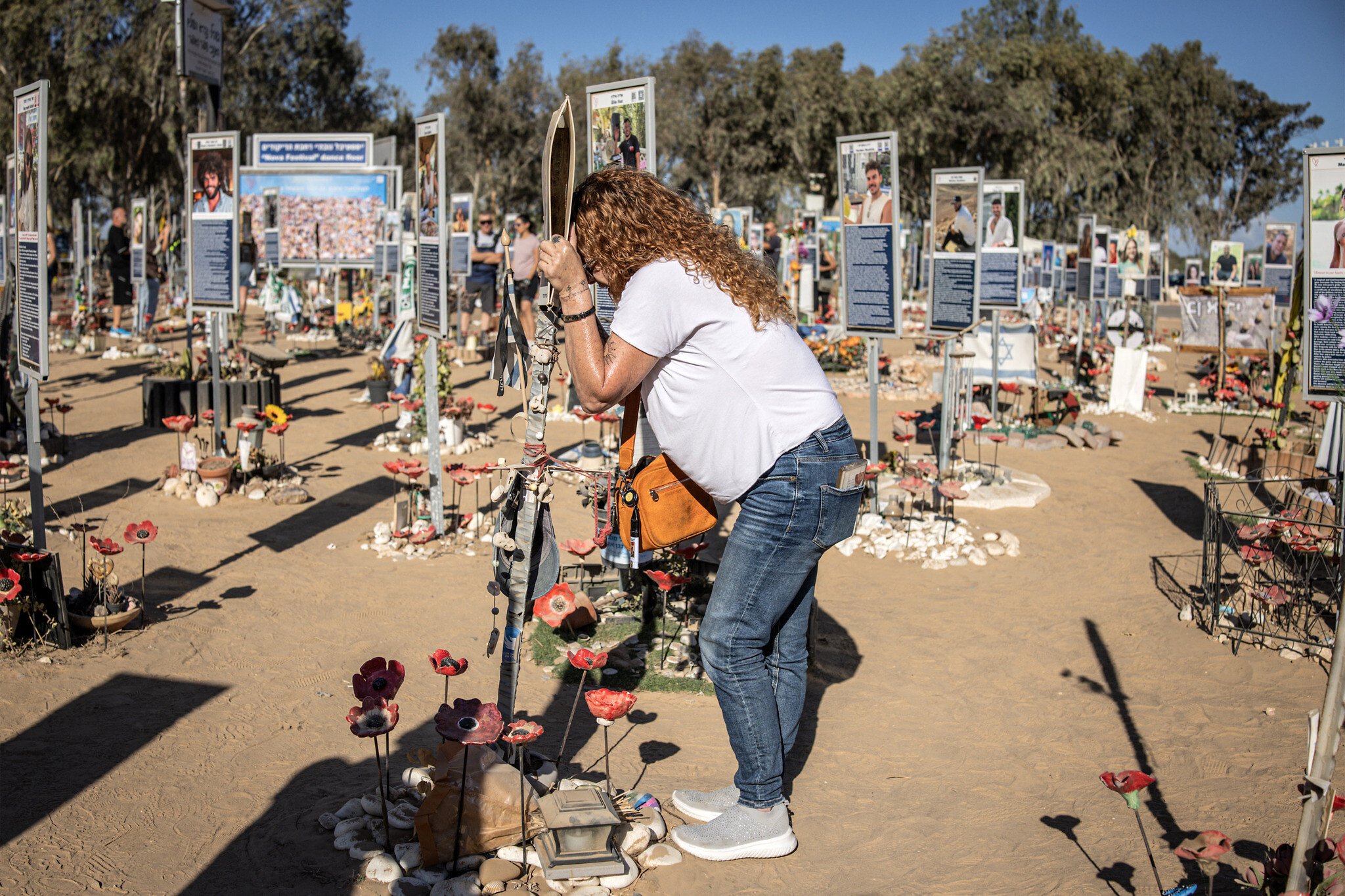
Two years after Hamas gunmen attacked the Nova festival in southern Israel, the desert site stands as both grave and shrine, where the living come to mourn the dead.
More than 370 people were slaughtered when Palestinian terrorists crossed from Gaza into Israel in the early hours of October 7, 2023, attacking the music festival and several nearby communities, with acts of extreme brutality and sexual violence.
Dozens were kidnapped and taken to Gaza, with many of them still held two years after the attack that sparked the ongoing war.
On Tuesday at dawn, dozens of relatives returned to the site, embracing one another and mourning the dead.
Tears streamed down mourners’ faces as they looked at photographs of loved ones — wedding portraits, holiday snapshots, dancing scenes and countless smiling selfies — most of them young, with their years of birth, and the same date of death, inscribed beneath.
At 6:29 a.m. — the precise time when Hamas launched its unprecedented attack — the small crowd observed a minute of silence.
However, alongside pain and sadness, there was still anger over the military response that day and what the families believe is insufficient investigation into the failures of that day.
“Where were the rescue forces? Where was the state? How come you were here for hours and no one saved,” the families said in a statement, according to the Kan public broadcaster.
“And yet two years later, we still have no answers. All the investigations they have presented to us are rubbing salt in the wounds and sand in the eyes of the families,” they said.
Read more: IDF okayed Nova music festival, but didn’t inform troops deployed at border, probe finds
Orin Baron’s 25-year-old daughter Yuval was among those killed.
“This is how we lived for two years. It’s the worst feeling in the world,” said Baron, recalling the evening before the attack, when she and Yuval had been laughing together in the kitchen.
Although she lives more than 100 kilometers (62 miles) away, Baron often returns to this patch of the Negev desert, where the former festival dance floor now resembles an open-air cemetery.
Tall metal poles stand like gravestones, each bearing a portrait of someone killed or taken hostage in the Hamas assault.
At their base bloom wild anemones — red desert flowers — which symbolize renewal in Israel’s south, alongside children’s drawings and small Israeli flags.
Now 57, Baron has stopped working to devote herself to preserving her daughter’s memory.
Yuval had just bought her wedding dress and died beside her fiancé, 33-year-old Moshe Shuva.
“I think it’s very important that people will know from the first place the real stories, not like what they read or heard or something like that,” said Baron.
As she carefully cleaned Yuval and Moshe’s memorial and arranged fresh flowers, others lit candles or kissed photographs of their loved ones.
Two young men, who had arrived before dawn, rolled joints while listening to electronic music.
At 6:29 am, they turned off the music and observed the minute of silence.
“Three of our beloved friends unfortunately died here,” Alon Musnikov, 28, who survived the attack, told AFP.
“And today… two years after the incident… we still [can’t] believe it really happened,” Musnikov said.
On that day, Musnikov was among a group of 10 festivalgoers. Only seven returned home alive.
“We live the trauma every day… it feels as if it happened yesterday,” the law student said, his face tense.
In the distance, the muffled echo of artillery and explosions drifted from the Gaza Strip.
“I don’t hear it. The first time that I was here, it was very frightening, but now, I don’t feel anything,” Baron said.
Karen Shaarabany, whose 21-year-old daughter Sivan was killed, said she heard explosions each time she visited the site.
“Honestly, in a way we like it,” said Shaarabany, 57. “Obviously, I would like it [the Gaza war] to be finished, but so long as it’s not finished, I don’t want calm.
“Why should they have the calm? Why should their [lives] be calm?” asked the bereaved mother.
She recalled, minute by minute, the ordeal of Sivan and her four friends, who tried to flee the festival site as it came under attack but were forced to turn back.
Shaarabany remembers every message her daughter sent that morning — the first at 6:45 am, reading: “Everything is fine.”
The last message came at 8:10: “They’re shooting at us. We’re hiding. I’m scared.”
Sivan had attended the festival with four friends.
Only one returned alive, Shaarabany said, gently brushing the dust from the memorials of the four young women who died.
“What happened here is inexcusable,” she said, holding back tears.


